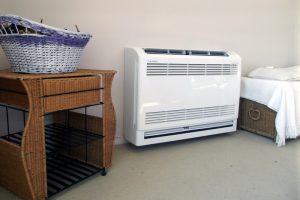One of the advantages of having a heat pump in Canby is that they operate on electricity, so you don’t need to worry about having maintaining a supply of fuel to keep yours running. Where a furnace call for you to purchase supplies of oil or natural gas, and a wood stove means keeping potentially messy firewood around, a heat pump runs cleanly on electricity.
Heat pumps are good at using electricity, too. They are often able to produce heat energy that can be as much as three times the electricity they draw to produce it. This means not just convenience, but also a big savings, just by virtue of using electrical power.
The risk there, of course, is that if and when the power goes out, so does the heat pump. That means when a big winter storm drops a tree on the local power line, things can get cold inside mighty quickly. For these situations, you should have a backup heating solution on hand to keep everyone comfortable in the short term. And, as a responsible homeowner, you likely already have this taken care of.
But what happens when the power comes back on? Can you just fire your heat pump right back up without missing a beat?
The short answer is “no.” You should not do that, for at least two reasons. First of all, after any power outage, you should always take care to turn on appliances gradually over a period of time rather than all at once in order to avoid a spike in demand at the power company, which can blow a grid. That’s just a general tip.
Specific to heat pumps, though, there is a unique concern. If the heat pump loses power for more than 30 minutes, the refrigerant can get too cold to flow properly, so turning it right back on can cause the whole thing to conk right out. Instead, do the following:
- Make sure the heat pump is off. You can do this during the power outage.
- Once power comes back on, turn the heat pump to the “Emergency Heat” setting. This will allow the compressor to warm up slowly and get the refrigerant warm enough to start flow freely again.
- Wait. The time you need to wait varies depending on the size and manufacturer of your heat pump, so refer to the manual. In general, you should wait at least 6 hours.
After this process, your heat pump should be ready to resume normal operation without issue.
 There’s a lot that differentiates a heat pump from a central air conditioner or furnace. When it comes to maintenance, however, there’s one key difference that is most important for homeowners to understand:
There’s a lot that differentiates a heat pump from a central air conditioner or furnace. When it comes to maintenance, however, there’s one key difference that is most important for homeowners to understand:
Join Us Online